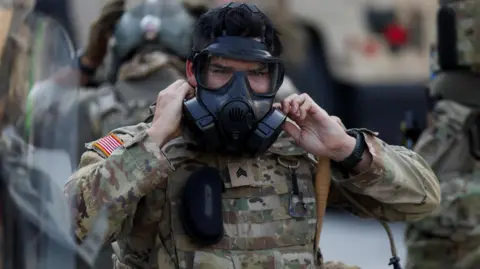Appeals court temporarily allows Trump to keep National Guard in LA
 Reuters
ReutersAn appeals court has temporarily blocked a federal judge's order that directed the Trump administration to return control of California's National Guard troops back to the state.
The appeals court's decision came hours after a federal judge said Trump's deployment of the troops to Los Angeles to quell immigration raids was illegal.
Trump said he was sending the troops - who are typically under the governor's authority - to stop LA from "burning down" in protests against his immigration crackdown.
California Governor Gavin Newsom and other local officials rejected the move, however, and said it was an unnecessary provocation. The appeals court said it would hold a hearing on Tuesday.
At an earlier federal court hearing, Judge Charles Breyer said the question presented by California's request was whether Trump followed the law set by Congress on the deployment of a state's National Guard.
"He did not," the judge wrote in his decision. "His actions were illegal... He must therefore return control of the California National Guard to the Governor of the State of California forthwith."
But the judge stayed the order until Friday afternoon to give the Trump administration time to appeal against it. The administration did so almost immediately after the order was issued.
Newsom posted on social media on Thursday afternoon that "the court just confirmed what we all know — the military belongs on the battlefield, not on our city streets".
The Trump administration has said it took over California's National Guard to restore order and to protect Immigration and Customs Enforcement (ICE) agents as they swept up people in Los Angeles who were believed to be in the country illegally.
Despite Newsom's objections, Trump ordered a total of 4,000 National Guard troops and 700 Marines to help quell the unrest. Some of the Guard troops are now authorised to detain people until police can arrest them.
A president last deployed the National Guard without a governor's consent more than 50 years ago - during the civil rights era. It is more common for a governor to activate troops to deal with natural disasters and other emergencies, and then ask for federal assistance.
Before a packed courtroom on Thursday, a justice department attorney told Judge Breyer that Newsom did not need to be consulted when Trump issued his order.
"Governor Newsom was fully aware of this order…he objected to it," Attorney Brett Shumate said. "There is one commander-in-chief of the US armed forces."
"No," Judge Breyer, the younger brother of former Supreme Court Justice Stephen Breyer, responded.
"The president isn't the commander -in-chief of the National Guard," he said but added there were times and situations where the president could become the head of the troops.
Breyer, who had donned a light blue bowtie, invoked the Constitution multiple times during the hearing, holding up a booklet copy of the document at one point.
"We're talking about the president exercising his authority. And the president is, of course, limited in his authority," he said. "That's the difference between a constitutional government and King George."
Before the judge's ruling, Secretary of Defense Pete Hegseth repeatedly refused to say if he would comply with Judge Breyer's order.
"What I can say is we should not have local judges determining foreign policy or national security policy for the country," Hegseth said, speaking at a House Armed Services Committee hearing on Thursday.
Hegseth said he would comply with a Supreme Court ruling.
The appeals court decision on late Thursday allows the National Guard troops to remain in Los Angeles as the case makes it way through the courts.
The Trump administration used a law that allows the president to call the National Guard into federal service when a "rebellion" is happening.
But California said in its lawsuit that the protests that have spanned nearly a week in LA - and included more than 300 arrests and the shutting down of a major freeway - did not rise to that level.
"At no point in the past three days has there been a rebellion or an insurrection. Nor have these protests risen to the level of protests or riots that Los Angeles and other major cities have seen at points in the past, including in recent years," the lawsuit read.
Additional reporting by Ana Faguy in Washington, DC

Follow the twists and turns of Trump's second term with North America correspondent Anthony Zurcher's weekly US Politics Unspun newsletter.
Readers in the UK can sign up here. Those outside the UK can sign up here.
